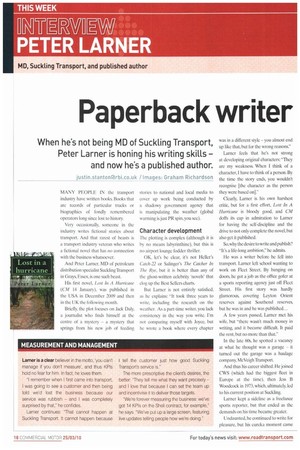Paperback writer
Page 18

Page 19

If you've noticed an error in this article please click here to report it so we can fix it.
When he's not being MD of Suckling Transport, Peter Lamer is honing his writing skills and now he's a published author.
justin.stantonfarbi.co.uk /Images: Graham Richardson
MANY PEOPLE IN the transport industry have written hooks. Books that are records of particular trucks or biographies of fondly remembered operators long since lost to history
Very occasionally, someone in the industry writes fictional stories about transport. And that rarest of beasts is a transport industry veteran who writes a fictional novel that has no connection with the business whatsoever.
And Peter Lamer, MD of petroleum distribution specialist Suckling Transport in Grays, Essex, is one such beast.
His first novel, Lost In A Hurricane (CM 14 January), was published in the USA in December 2009 and then in the UK the following month.
Briefly, the plot focuses on Jack Daly, a journalist who finds himself at the centre of a mystery — a mystery that springs from his new job of feeding stories to national and local media to cover up work being conducted by a shadowy government agency that is manipulating the weather (global warming is just PR spin, you see).
Character development
The plotting is complex (although it is by no means labyrinthine), but this is no airport lounge fodder thriller.
OK, let's be clear, it's not Heller's Catch-22 or Salinger's The Catcher In The Rye, but it is better than any of the ghost-written celebrity 'novels' that clog up the Best Sellers charts.
But Lamer is not entirely satisfied, as he explains: "It took three years to write, including the research on the weather. As a part-time writer, you lack consistency in the way you write. I'm not comparing myself with Joyce. but he wrote a book where every chapter was in a different style — you almost end up like that, but for the wrong reasons."
Lamer feels that he's not strong at developing original characters: "They are my weakness. When I think of a character, I have to think of a person. By the time the story ends, you wouldn't recognise [the character as the person they were based on]."
Clearly, Lamer is his own harshest critic, but for a first effort, Lost In A Hurricane is bloody good, and CM doffs its cap in admiration to Lamer for having the self-discipline and the drive to not only complete the novel, but also get it published.
So.why the desire to write and publish? "It's a life-long ambition," he admits.
He was a writer before he fell into transport. Lamer left school wanting to work on Fleet Street. By banging on doors, he got a job as the office gofer at a sports reporting agency just off Fleet Street. His first story was hardly glamorous, covering Leyton Orient reserves against Southend reserves, but he was in and he was published...
A few years passed. Lamer met his wife, but "there wasn't much money in writing, and it became difficult. It paid the rent, hut no more than that."
In the late 60s, he spotted a vacancy at what he thought was a garage — it turned out the garage was a haulage company, McVeigh Tiansport.
And thus his career shifted. He joined CWS (which had the biggest fleet in Europe at the time). then Jess B Woodcock in 1973, which, ultimately, led to his current position at Suckling.
Lamer kept a sideline as a freelance sports reporter, but that ended as the demands on his time became greater.
Undaunted, he continued to write for pleasure, hut his eureka moment came during news coverage of a natural disaster a few years ago -20 minutes of a half-hour news bulletin was dedicated to the disaster, which led Lamer to wonder what news items had not made the cut as a result.
A natural cynic
He says: "The media winds me up: they dictate what the news is. I'm cynical, so I thought would write something cynical about the media: about how they manipulate, and how they themselves are manipulated."
And Lost In A Hurricane was the result: "It's meant to he a [black' comedy, with a guy inventing stories to divert the news from the real events. What could those events be? I returned to that natural disaster."
Post-publication, he managed to get some coverage of his book in the local paper. Ahead of the piece appearing. Lamer visited his local bookshop in Upininster. He says: "1 went along to introduce myself I thought the owner might ask me to do a signing he didn't, "I told him there was a piece about the book about to appear in the local paper. He said: 'I'm glad you told me that because I've sold out, so l'll need to get some more copies in'.
-1 went home, told the wife, and she asked: 'How many has he sold?' I didn't
ask. I confess, live off the fact he said he'd sold out for years."
The joys of being a published author!
So, how many has Lamer sold? "I've sold 19 copies in the US. UK sales data runs 60 days behind. The book wasn't available in the UK until January"
What's next? The sequel. Deathbed Confessions, which again stars Jack Daly.
"I've learnt so much, and I'm absolutely convinced it will be much better [than Lost In A Hurricane'.
"Before I publish it. I need to think about publicising it. Everyone believes they've got a book in them; I believe I've got a good book in me," he asserts.
"Moulding the Beatles' lyric to his own situation, he jokingly ends the interview with: "I've got a steady job. but I want to be a paperback writer."




































































































































